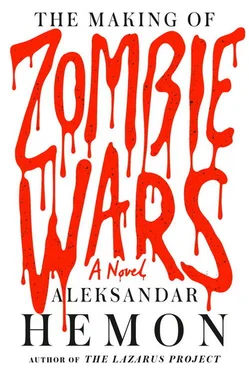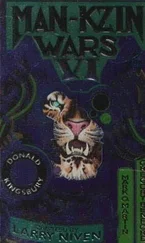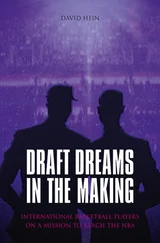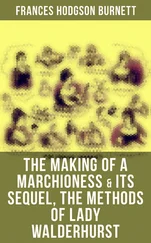As Major K is about to enter the nurses’ room, he hears a CRASH inside. He turns off the flashlight and presses his back against the wall, then crawls along it to look in through a small window. He sees a flashing move, too fast for a zombie — someone ducks behind a stack of boxes. He raises his gun and cocks it. He looks again, and this time spots an elbow of a living human sticking out, then an eye peeking from behind the box. There is GROANING in the hallway, then more zombies roaming. He pushes the door open and slips in, pointing the gun at CANCER PATIENT (37), bald, skinny, and wearing a hospital gown.
MAJOR KLOPSTOCK
(whispering)
Do not make a sound!
She shakes her head and stays silent. She shifts her gaze to look at something behind Major K. Still pointing his gun at her, he turns to see NURSE (55) and a chubby BOY (12), both shivering in fear. There is a FOREIGNER (40) kneeling next to them, holding a cell phone, from which a cord stretches to an outlet.
FOREIGNER
Power out.
MAJOR K
Everything’s out.
Ana lived way out in Lincolnwood, in a building that looked like a depressing dorm, what with its dun color and standard-issue windows, but was called the Ambassador. She buzzed him in, but didn’t tell him her apartment number. On his way up, Joshua pressed his ear against suspect doors, each of which offered the sounds of myriad lives: a radio gibbering in an obscure language; Mexican oompah-oompah music; a desperate, barking dog; the hum of an empty space. Ana’s place was up on the Ambassador’s top floor. There was a crowd of shoes in front of the door, lit dispiritingly by the skylight. Some were lined up, some thrown together: men’s shoes, wide and deep and brown; Chuck Taylors; fine Italian leather shoes. There were women’s high heels too, and flat ballet shoes and even flower-patterned rain boots. Visions of the Holocaust shoe heaps came to Joshua and in their wake a memory of Nana Elsa’s Florida plastic flip-flops, conforming to her bunions perfectly. She’d had them for at least fifteen years and wouldn’t hear of getting rid of them. In fact, she never got rid of any of her shoes; Papa Elie disposed of them behind her back, so she never let her precious flip-flops out of sight. She wanted to be buried with those flip-flops. Nothing exists from whose nature some effect does not follow.
Joshua took his tennis shoes off and placed them at a distance from all the others. Then it occurred to him that that might be interpreted as his being a snob, and moved them a little closer, but still not touching any other shoes. He walked in, somewhat embarrassed by his white tube socks — his grandmother’s grandson, he too had a hard time getting rid of things. A teenage girl walked out of the bathroom, her purple shirt severely tucked into a pair of latex-tight jeans. She considered Joshua and said, “Hi!” with a ladylike nod. “Hi!” Joshua nodded back. She was lanky, her long mane brushing her skinny, half-pubescent behind. She had narrow, awkward-looking feet and a constellation of pimples on her chin, but she seemed to be at ease with herself. You could tell she was Ana’s daughter: the same green eyes, the same long neck, the same, if unripe, sadness.
“I’m outta here,” she said. “You kids have loads of fun.”
Her English was purely American, no accent whatsoever. Should she not have a Bosnian accent? She slipped past Joshua, picked her shoes off the pile, and scuttered down the stairs. In Joshua’s memory of his adolescence, there was no need to worry about the ease: he’d spent much of his teenagehood watching old movies in the basement, thus escaping the ubiquitous unease.
In the center of the dining room there was a long table, thick with plates of food and bottles of booze. Everyone crowded around it, teeming like wildflowers, no space between the chairs. On the far side of the table, Captain Ponomarenko and his faithful wife drowned in a sofa, their chins nearly touching the edge of the table. Bega was there too, fully present in his Bad Brains T-shirt, Corona in hand, pontificating to a woman slowly backing away as he leaned into her to make his indisputable points. What was he doing there? Had she invited people Joshua knew? Why would she do that? She had invited Stagger too — or so he’d claimed — to this party. Terrified, Joshua scanned the room. Apart from his students and Bega, everyone was comfortingly anonymous. He waved wordlessly at everyone, which everyone ignored. He stood at the door, waiting for something to happen and determine what he should do next. Eventually, he turned to go elsewhere and there was Ana behind him, her short hair so freshly hennaed as to approach purple, matching nicely her sky-blue summer dress and her cleavage beaded with sweat. She had a tray of thin-sliced meat in her hands.
“Teacher Josh,” she said. “Super to see you.”
She wiggled past him and he had an urge to grab her and keep her by his side. Her face was flushed, and Joshua determined he should be hot as well: he wiped the imaginary sweat off his forehead with his hand, and everyone laughed. “I’m Joshua,” he said, but no one bothered to introduce themselves. Bega finally raised his beer to greet him then poured all of it into his mouth.
“What are you doing here?” Joshua ventured to ask.
“Bosnia is small world,” Bega said. “And world is small Bosnia. And I live close.”
The rest of the guests raised their glasses, except for Captain Ponomarenko and Larissa, who hailed him with an ungenerous stare, as if his arrival irreversibly spoiled the reigning harmony. Ana joked in her language with the people at the table and everybody neighed with laughter looking at him. They all appeared Eastern European, but he could not determine what exactly it was that made them so. The flat back of male heads, perhaps. Or the dark circles around their eyes. Or the abundance of defiantly unhealthy food. Or the huddling around the table. On all other nights we eat either sitting up or leaning back; on this night we lean forward and giggle at strangers.
Ana put the platter down and returned to him. “What did you say to them?” he asked.
“You don’t know if you don’t learn Bosnian,” she said and winked at him mischievously. “Let me show you where is the kitchen.”
It wasn’t clear why he needed to know where the kitchen was, but she touched him above the elbow to direct him and his biceps rubbed against her breasts. He could feel their fullness, their weighted maturity. Kimmy’s breasts were small, somehow expressive of her control, as if she willfully prevented them from growing.
“So, you know Bega,” Joshua said. “Small world.”
“I know him. He lives close.”
“Captain Ponomarenko and Larissa are here too. They hate the thought of me.”
“Yes,” she frankly confirmed. “But I like you.” There was the momentary purse of her lips and a flash of the dimples before she smiled, rendering Captain USSR and his wife harmless and irrelevant. She bespoke the supreme authority of the governing hostess — everyone in her domain was going to be taken care of. Kimmy had a similar quality, but her domain was spare: he and Bushy were the only ones populating it. Ana pulled up her bra and Joshua compliantly followed her to the kitchen.
“You know Bega?” she asked.
“We’re in the same screenwriting workshop.”
“What is workshop?”
“Oh, we share our work with others and then talk shop about it.”
“Nice,” she said, in a way that suggested that she understood what he was talking about. Kimmy claimed that the workshop format had emerged at the same time as group therapy, but she hadn’t experienced Graham’s workshopping, which was as far from healing as can be.
In the small kitchen, there was a man taking up half of the space. A cleaver in hand, he was dismembering what appeared to be a whole lamb stretched on a plank, its eyes about to pop out in roasted surprise. Whenever the man brought the cleaver down, everything on the counter leapt up and the lamb raised its head. Barbed wire was tattooed in a circle around the man’s neck, as if to keep his head and body segregated.
Читать дальше












